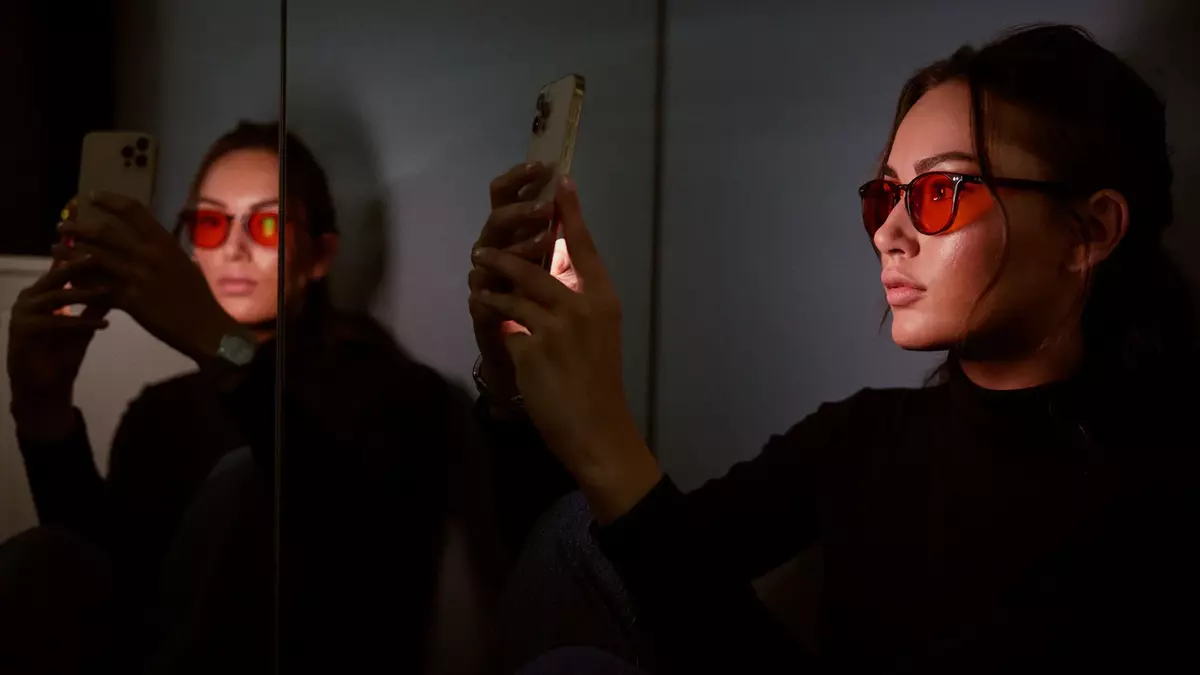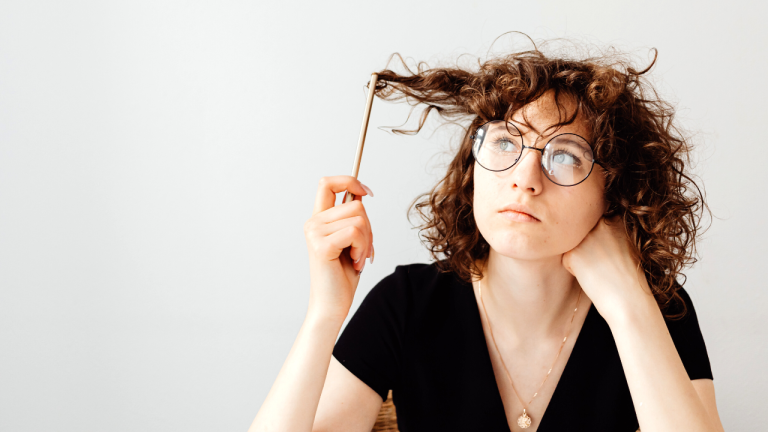Do you want to know a secret? By reading this blue-light-blocking glasses review, you will know that using these glasses might be the best hack to optimize your sleep. What’s so special about them? Besides looking pretty slick, they block 100% of blue light. In this post, we’ll explain everything you need to know about blue-light-blocking glasses, their benefits, the different lenses available, and our personal experience using them.
Listen to the Blog
Blue-Light-Blocking Glasses Review – What Are These Glasses About?
What are blue light-blocking glasses?
As the name suggests, blue-light-blocking glasses block blue light, but why should you filter it in the first place? As we’ve explained in our previous video, light is essential to your well-being and performance. You should get as much of it during the daytime and as little as possible after dark. That’s because exposing yourself to blue light at night time, for example, by using your smartphone or watching TV, is unnatural and tricks your brain into thinking it’s daytime. In fact, the blue wavelength emitted by digital displays and artificial light stimulates and energizes the brain, which keeps you alert and awake while increasing your cortisol levels. At the same time, blue light suppresses melatonin production, which is the exact opposite of what you need for optimal sleep. To give you an idea, even the smallest amount of blue light after dark is enough to stop melatonin secretion and deplete your melatonin levels in just a few minutes.

This process negatively affects your hormonal balance and can disrupt your circadian rhythm, which can lead to serious health problems. And that’s where blue-light-blocking glasses come into play.
Benefits – Blue Light-Blocking Glasses Review
Exactly. Blue-light-blocking glasses have many benefits for your circadian rhythm, sleep, and mood. Research has found a clear correlation between reduced exposure to blue light and sleep quality, through different studies, including placebo-excluding tests.

Key similarities between these studies are that people have been able to adjust their sleep awake time more optimally by falling asleep earlier and easier. For example, studies on insomnia and jet lag showed that by using blue-light-blocking glasses, people could decrease their symptoms and rebalance their sleep, thanks to the glasses. Of course, the glasses themselves do not provide these effects, but the way they affect you biologically. When the glasses block blue light from entering your retina to the cells responsible for transporting visual information to your brain, your brain does not get input of “daytime” and starts naturally producing melatonin.

One study was even done on pregnant women to understand if blue-light-blocking glasses could be a natural compensation for medical sleep treatment, and the study showed positive results. The production of melatonin and balanced sleep-wake time has enabled people to increase the amount of deep sleep and feel calm and relaxed before bed. As sleep is one of the most important factors for well-being, this significant increase in sleep quality also resulted in better mood and mental stability.
Different Types of Lenses

Now you might be curious to test blue-light-blocking glasses, and you should know there are different lens colors: clear, yellow, orange, and red. That’s not a styling difference but a performance one. Not all lenses are created equal, and it’s important you select the right one for your needs. The data we’ll share with you is about Filter Optix’s glasses, which are the ones we use and recommend. You can actually get 15% off by using the code BEYONDSAPIENS15 at checkout. In general, there are 2 macro-categories: daytime lenses and nighttime lenses. Clear and yellow lenses are made to be used during the day in front of digital devices, and they filter, respectively, 35% and 95% of blue light.

If you use them during the day, it’s very important you wear them only when looking at screens, and that you take them off during your breaks to look at natural light.

As per the nighttime lenses, orange and red both block 100% of blue light while also blocking some green light. Up to 520 nm with the orange lens and 550 nm with the red one.

So how can you choose the right lens for you? There are 2 main things to consider: how much blue light you want to filter and how much color distortion you are ok with. In fact, the more intense filtering capabilities you desire, the more color distortion you will have. For example, if you need color accuracy during your work day, you should opt for a clear lens instead of a yellow one. While in the evening, red ones are the absolute best for sleep optimization, but of course, everything you see or watch will be pretty much red.

So, if you’d like to still be able to distinguish some colors, then you should probably opt for the orange lenses. And in case you normally wear eyeglasses, I have good news for you, because Filter Optix also does blue-light-blocking glasses with prescription lenses!
Why Filter Optix
Why do we use Filter Optix? For us, quality is always a key driver when we choose different tools to optimize our health and performance. To give you a proper answer, I will share a quick story with you. We actually met the founders of Filter Optix at an event, and what struck us the most about this brand was the amazing quality of the products and the passion that Robin and Hendrik have for their business. These glasses have been designed to be the best on the market through lab-tested studies, and each detail has been considered. Filter Optix lenses have been designed to minimize reflections and are made of eco-biodegradable acetate material.
Linda’s Experience
We always test all the products before recommending anything, and my experience with these two glasses has been fantastic! Both me and Alessandro start using the yellow ones after sunset and switch to the red ones around 8 PM, which is two hours before my bedtime. I have always been an early bird, and my brain pretty much shuts down after 9 PM. So I have not noticed a massive change in my circadian rhythm but since I started wearing the glasses, I have felt more relaxed and calm in the evening. I fall asleep on average in 10 minutes and my deep sleep has increased by 20%.
Alessandro’s Experience
I’ve been on a quest to optimize my sleep for the past year and a half. During this period, I’ve tested and implemented a ton of different things – which we’ll share in a future video – but there was one thing I kept struggling with: going to bed early. My goal was to be in bed at a maximum of 11:30 PM, but I rarely made it, just because I was not sleepy enough. I would still get at least 8 hours of sleep, but I needed to improve. Since I started using blue-light-blocking glasses 3 weeks ago, boom, from day one I’ve been able to anticipate my bedtime by almost 2 hours. Now I regularly go to bed at about 10 PM, and there have been days where I’ve even fallen asleep before that, something that NEVER happened during my adulthood until now. In life, there’s hardly a quick fix for anything, and there are other habits you need to implement to maximize your sleep. Still, I must say that these blue-light-blocking glasses significantly improved my sleep. Now I feel sleepy at the right time, and by going to bed earlier, I can ensure I have overall higher quality sleep.
Summary
As you have just heard, we have experienced most of the benefits that research has shown. So we can only suggest that you try out blue-light-blocking glasses to see if they can help you improve your sleep and internal rhythm, just as they did for us. Don’t forget to use our code BEYONDSAPIENS15 to get 15% off from Filter Optix.
If you’re curious to learn more about us and are ready to go Beyond Sapiens, you can read more about our Business & Individual Maximization Coaching programs!
Blue-Light-Blocking Glasses Links
***Use the code BEYONDSAPIENS15 to get 15% off your new glasses***
→ Clear Lenses: https://filteroptix.com/collections/blue-light-computer-glasses
→ Yellow Lenses: https://filteroptix.com/collections/blue-light-glasses-yellow
→ Orange Lenses: https://filteroptix.com/collections/blue-light-glasses-orange
→ Red Lenses → https://filteroptix.com/collections/blue-light-glasses-red
Research
J Pineal Res. 2006 Aug;41(1):73-8. doi: 10.1111/j.1600-079X.2006.00332.x.
Blue blocker glasses impede the capacity of bright light to suppress melatonin production.
https://pubmed.ncbi.nlm.nih.gov/16842544/#
J Clin Endocrinol Metab. 2005 May;90(5):2755-61. doi: 10.1210/jc.2004-2062. Epub 2005 Feb 15.
Blocking low-wavelength light prevents nocturnal melatonin suppression with no adverse effect on performance during simulated shift work.
https://pubmed.ncbi.nlm.nih.gov/15713707/
Chronobiol Int. 2016;33(8):1037-44. doi: 10.1080/07420528.2016.1194289. Epub 2016 Jun 20.
Wearing blue light-blocking glasses in the evening advances circadian rhythms in the patients with delayed sleep phase disorder: An open-label trial.
https://pubmed.ncbi.nlm.nih.gov/27322730/
Chronobiol Int. 2001 Sep;18(5):801-8. doi: 10.1081/cbi-100107515.
Effect of light wavelength on suppression and phase delay of the melatonin rhythm.
https://pubmed.ncbi.nlm.nih.gov/11763987/
Chronobiol Int. 2009 Dec;26(8):1602-12. doi: 10.3109/07420520903523719.
Amber lenses to block blue light and improve sleep: a randomized trial.
https://pubmed.ncbi.nlm.nih.gov/20030543/
Eur J Cancer Prev. 2007 Aug;16(4):357-62. doi: 10.1097/01.cej.0000215622.59122.d4.
Prevention of melatonin suppression by nocturnal lighting: relevance to cancer.
https://pubmed.ncbi.nlm.nih.gov/17554209/
International Journal of Epidemiology, Volume 38, Issue 4, August 2009, Pages 963–970, https://doi.org/10.1093/ije/dyp178
Light-at-night, circadian disruption and breast cancer: assessment of existing evidence.
https://academic.oup.com/ije/article/38/4/963/851153






